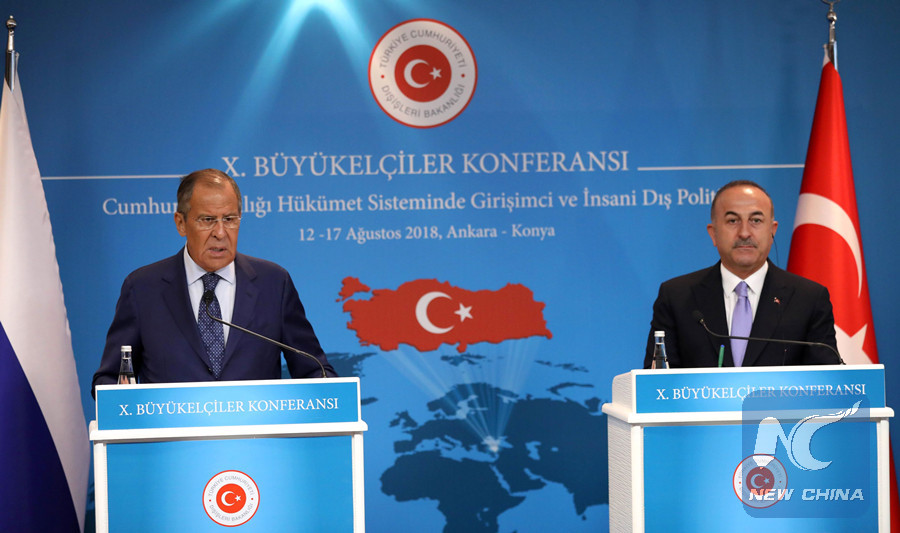
Turkey's Foreign Minister Mevlut Cavusoglu (R) and his Russian counterpart Sergei Lavrov attend a joint press conference following their meeting in Ankara on August 14, 2018. (AFP photo)
ANKARA, Aug. 15 (Xinhua) -- Turkey and Russia display further rapprochement after the United States imposed sanctions on Moscow and Ankara on different grounds.
Russian Foreign Minister Sergei Lavrov pays a two-day visit to Ankara just after the Turkey-U.S. ties hit historical deterioration.
Turkey and Russia will take steps to "enhance strategic partnership" between the two countries, Lavrov said on Tuesday at a joint press conference with his Turkish counterpart Mevlut Cavusoglu.
"We are at a turning point in the World. We are at a time of transition from bipolar order to multi-polarization," he said at a press conference with Turkish Foreign Minister Mevlut Cavusoglu.
Russia hopes that a reasonable approach will prevail in international relations and countries will return to a depoliticized dialogue, Lavrov said.
He also noted that Moscow appreciates Turkey's rejection to join the anti-Russia sanctions by the West, saying the U.S. "unlawful and illegitimate" sanctions policy cannot last for long.
U.S. sanctions, including the latest round targeting Turkey, undermine all principles of global trade and in time this move will undermine the role of U.S. dollar as a settlement currency, he said.
U.S. sanctions imposed on Turkey are shattering the former's reputation, Turkish Foreign Minister Mevlut Cavusoglu said.
"The era of bullying must end," the minister said and called on the U.S. to return to a dialogue, warning that threats and pressure on Turkey would cause chaos.
At the weekend, Turkish President Recep Tayyip Erdogan said that Ankara was preparing to switch to using national currencies with its trading partners, such as China, Russia, Iran and Ukraine. Ankara was also ready for such a move in trade with the European Union, he added.
Turkey's national currency lira has lost almost 20 percent of its value against U.S. dollars since Friday, amid ongoing strain between Turkey and the U.S. over detention of American pastor Andrew Brunson.
The lira tumbled to a historical low on Friday after U.S. President Donald Trump authorized a 20 and 50 percent tariff hike on imported Turkish aluminum and steel, respectively.
The U.S. Congress also passed a bill prohibiting the sale of F-35 jets to Turkey pending a review assessing the possible risk associated with Ankara's purchase of the S-400 air defense system.
Russia backed Erdogan in urging countries to do business in their own national currencies rather than dollars. Moscow recently declared Moscow will decrease its holdings of U.S. assets in retaliation against increasing tariffs imposed by Trump on Russia and Turkey.
Russia seeks to use national currencies in trade with Turkey but the issue needs to be worked out meticulously, Kremlin spokesman Dmitry Peskov said Monday.
Russia's Foreign Ministry said on Monday that a four-way Syria summit "is planned in the upcoming future," with the leaders of Russia, France, Turkey and Germany attending. The summit focusing on Syria and the wider region will be held in Istanbul on Sept. 7.
These four countries are also known to have been opposing the sanctions of the U.S. on Iran.
Turkey has come to the point of seeking new allies, according to Burhanettin Duran, coordinator of Foundation for Political, Economic and Social Research (SETA).
"Turkey has come to this point over irresponsible actions the U.S. in the past few years. The U.S. is having the same attitude towards not only to Turkey but also to China, Russia, Iran and Venezuela," he said, noting that this perspective introduces a new world order.
Murat Yetkin, commentator of Hurriyet Daily News, said that world leaders including Russia's Putin, Germany's Merkel expressed that U.S. President Donald Trump was displaying his power.
"He was trying to use economic sanctions and tariffs as a political weapon against his country's economic rivals, including China and the European Union," said the leaders.
"Trump managed to unite leaders, from Merkel to Putin, for supporting Turkey, and banks and opposition parties in Turkey are in support of the government against them," he said.

